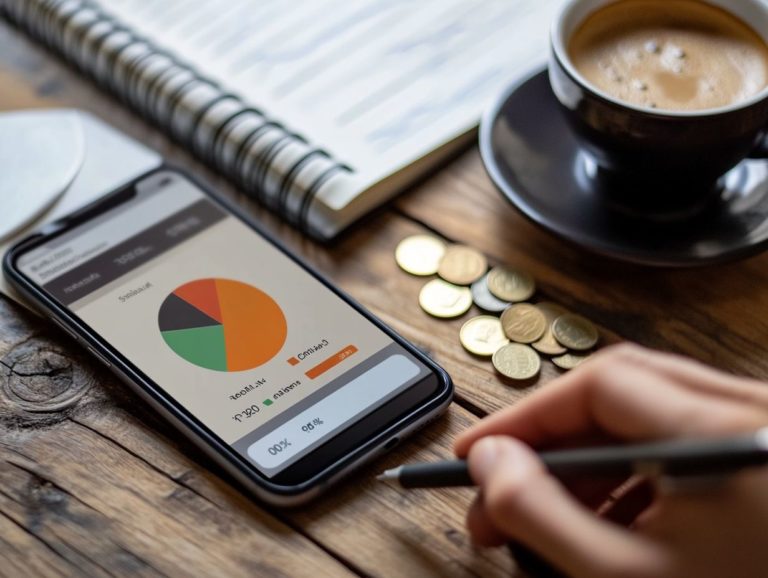How Can I Use Budgeting to Plan for a Major Purchase?
Making a major purchase can evoke a mix of excitement and apprehension. Whether you’re contemplating a new car, planning a dream vacation, or considering home renovations, grasping your financial landscape is essential.
This guide delves into the significance of budgeting for substantial expenses, providing practical steps to craft a robust plan. You ll discover how to evaluate your needs, research available options, and establish realistic goals, along with strategies for adhering to your budget and exploring alternative financing methods.
Are you ready to make that big purchase? The time to act is now! Let s turn your dreams into reality.
Contents
- Key Takeaways:
- The Importance of Budgeting for Major Purchases
- Steps to Creating a Budget for a Major Purchase
- Tips for Sticking to Your Budget
- Avoiding Impulse Purchases
- Seeking Out Deals and Discounts
- Alternative Ways to Finance a Major Purchase
- Exploring Financing Options
- Considering the Pros and Cons of Borrowing
- Frequently Asked Questions
- How Can I Use Budgeting to Plan for a Major Purchase?
- Why is budgeting important when planning for a major purchase?
- What steps should I take when using budgeting to plan for a major purchase?
- What are some tips for effective budgeting for a major purchase?
- Is it possible to save for a major purchase without a budget?
- How can I stay motivated to stick to my budget when saving for a major purchase?
Key Takeaways:

- Budgeting is crucial for successfully planning and affording a major purchase.
- Before creating a budget, assess your needs and wants to determine the true cost of the purchase.
- Sticking to a budget requires tracking expenses, avoiding impulse purchases, and seeking out deals and discounts.
The Importance of Budgeting for Major Purchases
Budgeting for significant purchases is a vital strategy that elevates your financial landscape and significantly influences your overall financial journey. Whether you’re considering a home or a car, understanding your credit score and exploring your financing options is crucial. Additionally, if you’re planning a getaway, learning how to use a budget to save for a vacation can help you make well-informed decisions.
By setting up a methodical savings plan and appropriately allocating your funds, you can achieve your savings goals while ensuring your financial health remains intact. A money expert can help you consider unexpected expenses and debt obligations, as these elements can greatly affect the effectiveness of your budgeting efforts.
Understanding Your Financial Situation
Understanding your financial situation is crucial for making informed decisions about significant purchases.
This requires a thorough assessment of your financial landscape, including your credit score and debt-to-income ratio.
Your debt-to-income ratio shows how much you owe compared to how much you earn. It helps lenders understand your ability to pay off loans.
These figures are more than mere numbers; they narrate a story about your financial habits and stability. For example, a strong credit report can greatly influence loan approvals and interest rates, while your debt-to-income ratio acts as a vital gauge of your capacity to manage monthly obligations.
To effectively assess your budget, begin by meticulously tracking all incoming and outgoing expenses, categorizing them into essentials and discretionary spending. This approach will reveal areas where you can trim the fat.
Regularly reviewing your credit report will keep you acutely aware of how your financial behaviors shape your overall picture. With this insight, you can make strategic decisions that pave the way toward achieving your financial goals.
Benefits of Planning Ahead
Planning ahead for major purchases offers a wealth of advantages. It allows you to meet your financial goals, adopt effective savings techniques, and consult with a money expert who can guide you through the maze of financing options. For more detailed strategies, check out how to save for a big purchase.
By carefully mapping out your expenses and strategically setting aside funds, you can gradually build a nest egg that not only supports significant purchases but also enhances your overall financial wellness. This foresight sharpens your decision-making skills, enabling you to compare costs and uncover the best deals available in the market. With the aid of cost comparison tools, you can steer clear of impulse buys and ensure that your hard-earned money is spent wisely.
Engaging a money expert can be a game changer. They provide expert insights and help tailor strategies that align with your personal financial objectives, paving the way for a more secure and prosperous financial future.
Steps to Creating a Budget for a Major Purchase
Creating a budget for a significant purchase requires a systematic approach. You begin by identifying your savings goals, laying the foundation for a comprehensive financial plan that accommodates all the costs associated with your desired item. Additionally, understanding how to use budgeting to prepare for large events can also enhance your financial strategy, whether it’s a home or a vehicle.
This methodical strategy ensures that you are well-prepared and aligned with your financial objectives.
Assessing Your Needs and Wants

Assessing your needs and wants is a crucial step in the budgeting process. It helps you clarify your financial priorities and align them with your goals. This ensures that your personal spending truly reflects what matters most to you.
By distinguishing between necessities like housing, groceries, and healthcare and discretionary items such as fine dining or entertainment subscriptions, you can make informed choices about how to allocate your resources. For example, while a monthly gym membership might be a luxury for some, it could be essential for others seeking to maintain their health and wellness.
Understanding these distinctions simplifies expense tracking and enables more effective savings and investment strategies. This approach helps you focus on spending that supports your financial stability and makes you happier.
Researching Costs and Options
Researching the costs associated with your major purchase is crucial. It allows you to explore financing options like mortgage choices for a home or car loans, all while factoring in the necessary insurance coverage.
Grasping the full scope of expenses ensures that you’re financially prepared and can sidestep any unexpected surprises along the way. With the wealth of resources available online, strive to pinpoint reliable platforms for cost estimates, such as government websites, consumer reviews, and reputable financial institutions.
Each financing route whether it’s fixed-rate mortgages, adjustable-rate mortgages, or personal loans comes with its own set of advantages and disadvantages that deserve your careful attention. For example, while fixed-rate mortgages offer the comfort of stable payments, adjustable-rate options might tempt you with lower initial rates, though they carry the risk of future increases.
By evaluating these factors thoroughly, you ll be enabled to make a more informed purchasing decision.
Setting Realistic Goals and Timelines
Setting realistic goals and timelines is essential for crafting an effective budget. It shapes your savings plan and ensures that your financial strategy aligns seamlessly with your major purchase aspirations.
To start, take a moment to outline your aspirations clearly, considering your desires whether it s a new home, a dream vacation, or something else entirely. By using the SMART criteria which stands for Specific, Measurable, Achievable, Relevant, and Time-bound you can transform these dreams into specific milestones. This involves making each goal measurable by determining exactly how much money you ll need and when you ll need it.
Next, assess whether these goals are attainable based on your current income and expenses. It s vital to ensure that your objectives resonate with your overall financial wellbeing. Establishing a clear deadline infuses a sense of urgency that drives commitment and makes your entire savings journey more structured and focused.
Tips for Sticking to Your Budget
Sticking to your budget demands consistent effort and discipline. By implementing effective strategies like expense tracking, cultivating strong financial habits, and utilizing automated savings, you can significantly enhance your ability to stay on course.
These practices streamline your budgeting process and enable you to achieve your financial goals with confidence and ease.
Tracking Expenses and Adjusting as Needed
Tracking your expenses is key to unlocking your financial success! It allows you to assess your budget in real-time and make necessary adjustments that keep your financial habits aligned with your savings goals.
Start using tools like apps or spreadsheets now to gain valuable insights into your spending! By employing various methods, you’ll pinpoint areas ripe for improvement. Regularly reviewing these tracked expenses fosters a sense of accountability and enables you to make more informed financial decisions.
For example, embracing a method like the 50/30/20 rule spending 50% of your income on needs, 30% on wants, and saving 20% can help you allocate your income wisely, enhancing your budgeting success. Dedicating time each week or month to analyze your financial trends will lead to smarter adjustments, ultimately promoting healthier financial habits and unlocking your greater savings potential.
Avoiding Impulse Purchases

Avoiding impulse purchases is crucial for maintaining your budget and reaching your savings goals. Implementing a strong financial strategy that categorizes your expenses can help reduce the temptation to overspend.
Mindful spending plays a vital role in this journey. It prompts you to reflect on your purchases instead of making hasty decisions. A great technique is to establish clear budget categories. This will show where your money should go and where it needs to be controlled.
Consider a waiting period like a 24-hour rule before buying non-essential items. This allows you to reflect on whether the purchase truly aligns with your financial priorities.
By blending these strategies, you can transform your approach to spending and cultivate a more thoughtful and sustainable financial lifestyle.
Seeking Out Deals and Discounts
Looking for deals and discounts can boost your budgeting efforts. This helps you make the most of your financial resources when purchasing consumer products.
In today s marketplace, you can stretch your budget further by using cost comparison tools and services. Comparing prices across various platforms helps you find the best offers and ensures wise spending of your hard-earned cash.
Using savings automation in your purchasing routine simplifies securing discounts. It creates a seamless way to track expenditures while consistently saving money.
These practices help you make informed decisions and foster a financial environment where savings become the norm.
Alternative Ways to Finance a Major Purchase
Exploring alternative ways to finance a major purchase opens up a world of flexible financing options tailored to your unique budget and financial situation.
This journey includes looking into various loan conditions and potential refinancing opportunities that can enhance your financial strategy.
Exploring Financing Options
Exploring financing options for major purchases is essential. It allows you to assess loan conditions, understand payment methods, and see how your credit score influences your eligibility.
Today s financial landscape offers many choices. Whether you’re considering traditional mortgages for home buying, personal loans for immediate needs, or flexible credit options like credit cards, each solution targets different financial strategies and goals. Evaluate interest rates, repayment terms, and overall costs to find the best fit for your financial picture.
Checking your current credit status can help you identify which options are accessible and beneficial. This ensures you make a well-informed decision that aligns with your financial goals.
Considering the Pros and Cons of Borrowing
When considering borrowing for a significant purchase, carefully evaluate the pros and cons. This analysis deeply impacts your financial strategy and the terms of future loans.
Recognizing the benefits, like immediate access to funds and the chance to build a solid credit history, helps you make informed decisions. However, it’s crucial to acknowledge potential downsides, such as the weight of debt and the risk of damaging your credit score if payments are missed.
Your long-term financial health may suffer if borrowed amounts stretch your monthly budget too thin. Understanding the intricacies of loan conditions is vital; hidden fees and interest rates can significantly alter total costs, leading to unforeseen challenges.
Frequently Asked Questions

How Can I Use Budgeting to Plan for a Major Purchase?
Budgeting is a great tool for planning a major purchase. Learning how to create a budget for major purchases helps you control spending and save money for your desired item.
Ready to take charge of your finances? Start budgeting today!
Why is budgeting important when planning for a major purchase?
Budgeting helps you track your spending. This way, you can avoid overspending on things you don t need and save for your major purchase.
What steps should I take when using budgeting to plan for a major purchase?
Start by figuring out how much you need to save. Next, create a budget that covers your essentials while allowing space for savings.
Finally, stick to your budget and check your progress regularly.
What are some tips for effective budgeting for a major purchase?
Be realistic with your budget and adjust it as needed. Cut back on unnecessary expenses and look for ways to save, like using coupons or hunting for sales.
Is it possible to save for a major purchase without a budget?
You can save without a budget, but it s tougher to stay focused and meet your savings goals. A budget helps you spend intentionally and prioritize savings.
How can I stay motivated to stick to my budget when saving for a major purchase?
Track your progress regularly and celebrate milestones. Set smaller, achievable goals to keep your motivation high as you work toward your ultimate savings target.






